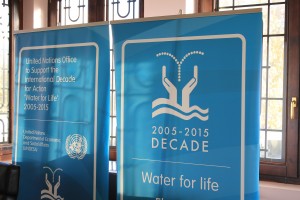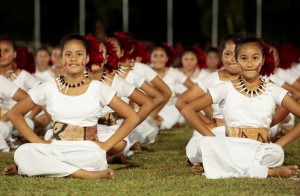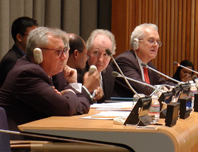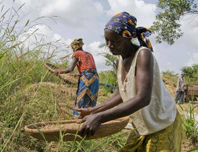DESA News
Volume 19, No.01 - January 2015
Global dialogue on development
 The post-2015 international agenda for water and sanitation will be decided now. Taking place on 15-17 January in Zaragoza, Spain, the UN-Water International Zaragoza Conference focuses on bringing the post-2015 agenda into action by highlighting tools for implementation (financing, technology, capacity development) and governance frameworks.
The post-2015 international agenda for water and sanitation will be decided now. Taking place on 15-17 January in Zaragoza, Spain, the UN-Water International Zaragoza Conference focuses on bringing the post-2015 agenda into action by highlighting tools for implementation (financing, technology, capacity development) and governance frameworks.
The UN-Water Annual Zaragoza Conferences serve UN-Water to prepare for World Water Day which is celebrated annually on 22 March. This year, the conference is part of the road map for World Water Day 2015, which will focus on ‘water and sustainable development’.
More than 300 participants from UN Agencies and programmes, experts, representatives of the business community, governmental and non-governmental organizations will meet to draw conclusions based on existing practice and the exchange of views between governments and stakeholders. This is also the last year of the International Decade for Action ‘Water for Life’, so it is especially important for taking stock of and learning from achievements as well as planning the next steps.
Freshwater is central to all development. Challenges are growing, spreading, multiplying across the world – from urbanization and over-consumption, under-investment and lack of capacity, poor management and waste and the demands of agriculture, energy and food production. Freshwater is not being used sustainably according to needs and demands.
Yet many water problems are economic, social and political in nature and could be addressed through intelligent and effective governance to optimize use between sectors and ecosystems and balance current and future needs. We need governments, the private sector and civil society to work more harmoniously and to make water integration intrinsic in decision-making.
The Zaragoza Conference is a space for dialogue. The Conference will focus on a practical examination of the necessary transformations and how institutional change, technology, capacity development and financing can help develop joint responses. It will draw from practical experience of Member States and stakeholder groups.
The event will be facilitated by the UN-Water Decade Programme on Advocacy and Communication (UNW-DPAC) and sessions will be convened by UN-Water members, programmes and partner organizations.
For more information:
UN-Water International Zaragoza Conference
Access a presentation introducing the Conference
United Nations World Water Development Report 4. Volume 1: Managing Water under Uncertainty and Risk
Measuring water use in a green economy
 A closing ceremony to mark the conclusion of the International Year of Small Island Developing States (SIDS) will take place from 3 – 6 pm on Monday, 26 January 2015, in the Trusteeship Council at UN Headquarters in New York.
A closing ceremony to mark the conclusion of the International Year of Small Island Developing States (SIDS) will take place from 3 – 6 pm on Monday, 26 January 2015, in the Trusteeship Council at UN Headquarters in New York.
The event will feature a video with highlights of the year, a cultural performance and a panel discussion on the way forward for SIDS. It is also expected to include remarks by the President of the General Assembly, Under-Secretary-General Wu Hongbo, the Chair of the Alliance of Small Island States, and the Champions of the International Year of SIDS.
The International Year highlighted both the challenges that this group of countries face but also the solutions that they bring to the table to address pressing global issues, as well as celebrating the rich culture and heritage of these countries.
Discussions, workshops, an exhibition, tweetathon, google hangout, photo competition, cultural celebrations and other activities were organized in the course of the year. The vibrant and distinct cultures of these islands, and their diversity and heritage, were important elements throughout.
One of the highlights of the year was the Third International Conference on Small Island Developing States, which took place from 1-4 September in Apia, Samoa. At the Conference, nearly 300 partnerships between governments, businesses and civil society organizations from all over the world were registered to support small island developing states, bringing the total value of these commitments to over USD $1.9 billion. The Small Island Developing States Accelerated Modalities of Action – or SAMOA Pathway – in which countries recognize the need to support and invest in these nations so they can achieve sustainable development, was also adopted at the Conference. A dedicated exhibition to highlight the International Year, was organized at the Samoa Conference with photos of the world heritage sites based in small island developing states, Magnum photos depicting people and lives of small island States, as well as literatures by authors from small islands.
For more information: Third International Conference on Small Island Developing States
 The UN Non-Governmental Liaison Service (UN-NGLS) and UN DESA’s Division for Sustainable Development (DSD) invite Major Groups and other civil society stakeholders to submit their official responses to the report to a central online repository via this online form.
The UN Non-Governmental Liaison Service (UN-NGLS) and UN DESA’s Division for Sustainable Development (DSD) invite Major Groups and other civil society stakeholders to submit their official responses to the report to a central online repository via this online form.
UN-NGLS and DESA-DSD provide this mechanism to support review of these important perspectives by all stakeholders in preparation for the continued elaboration of the post-2015 development agenda, beginning with the 19-21 January negotiating session at UN Headquarters in New York. A preparatory forum for stakeholders will be conducted on 16 January by DESA-DSD and UN-NGLS at UN Headquarters. More information about this forum will be provided soon.
In early January 2015, the Secretary-General will formally present the report and further discuss it with Member States. Links to all submissions will be published live as they are received here.
For more information:
Call for civil society responses to the Secretary-General’s Synthesis Report on the Post-2015 Development Agenda
 From 9 to 12 December, the United Nations General Assembly held a second and final round of substantive sessions to prepare for the Third International Conference on Financing for Development, which will be held in Addis Ababa, Ethiopia, on 13-16 July 2015. The overall theme of the sessions was “Enabling environment, systemic issues, follow-up process and learning from partnerships”. The substantive sessions will serve as inputs to the first drafting session on the outcome document, to be held from 27 to 29 January.
From 9 to 12 December, the United Nations General Assembly held a second and final round of substantive sessions to prepare for the Third International Conference on Financing for Development, which will be held in Addis Ababa, Ethiopia, on 13-16 July 2015. The overall theme of the sessions was “Enabling environment, systemic issues, follow-up process and learning from partnerships”. The substantive sessions will serve as inputs to the first drafting session on the outcome document, to be held from 27 to 29 January.
Following a first round of substantive sessions from 10-13 November, the December meetings focused on various issues, such as the international monetary and financial system, international tax cooperation, debt crisis prevention and resolution, trade, investment and technology, as well as domestic and international governance, statistical capabilities, and multi-stakeholder partnerships for development finance. The discussions included concrete proposals to inform the forthcoming negotiations on the outcome document of the Conference.
The sessions drew significant interest of Member States, with a high level of participation from capitals of both developed and developing countries, including senior officials from ministries of finance, foreign affairs and central banks. The major institutional stakeholders of the Financing for Development process contributed actively to the sessions, including the World Bank, IMF, UNCTAD and UNDP, together with many other parts of the UN system, such as UNICEF, UNEP, the Global Compact, UNODC, UN-Women and UN-OHRLLS. Other organizations such as the Financial Stability Board, OECD, GAVI, the Global Environment Facility, the Green Climate Fund and the Inter-American Development Bank also participated. Representatives of academia, civil society and the private sector contributed to all discussions and side events.
All substantive sessions will serve as inputs to the first drafting session on the outcome document, to be held from 27 to 29 January 2015.
To watch these informal sessions via UN Web TV, access presentations, statements and background information, visit the website of UN DESA’s Financing for Development Office (see the link provided below).
For more information:
UN DESA’s Financing for Development Office
 The Economic and Social Council held a special meeting on “Ebola: A threat to Sustainable Development” on 5 December 2014 focusing on linking emergency Ebola response to longer-term efforts to strengthen health systems
The Economic and Social Council held a special meeting on “Ebola: A threat to Sustainable Development” on 5 December 2014 focusing on linking emergency Ebola response to longer-term efforts to strengthen health systems
The meeting brought together high-level representatives of Member States, the United Nations system, the international organizations, civil society, health sector experts, academia and the private sector. The ministers and high level representatives for the affected countries as well as the high-level United Nations Officials addressed the Council.
The keynote addresses were followed by a panel discussion moderated by Dr. Paul Farmer, Co-Founder of Partners in Health and Special Adviser to the Secretary-General on Community Based Medicine, and Lessons from Haiti. Panelists included High-level Representatives from the African Union Commission, the United Nations system, the World Bank, Open Society Foundation, Center for Global Development and Ebola Private Sector Mobilization Group.
A number of strong messages came out of this discussion, which include: (i) the Ebola outbreak has halted these countries economic progress and has had a negative impact on sectors beyond health, including agriculture, education, and commerce; (ii) urgent delivery of funding pledges and increased technical assistance for national coordination of resources to be provided, (iii) debt relief and concessional loans to be provided to the affected countries; (iv) development actors to align their assistance with national response plans and financial needs as defined by Governments, including salary support for civil servants and frontline health care workers; (v) the international community to support the African Union’s decision to establish a Centre for Disease Control and Prevention in Africa that would enable the regional to prevent and effectively deal with Ebola and future pandemics; (vi) the private sector to play an important role in the Ebola response, including in bringing liquidity to the markets and in helping to strengthen health systems.
One of the strongest messages was to invest more resources in strengthening national institutions by investing directly through countries’ national institutions, prioritizing the public sector, including health, education, sanitation and the economy, so as to safeguard affected countries against future crises. This will allow the affected countries to build health systems capable of responding to emergencies and of withstanding shocks such as Ebola. All development actors were called to consider flexible and innovative funding modalities for immediate response to future health and other development-related crises, as well as financing for vaccines and treatments. Mechanisms are needed to direct resources to meet re-defined government strategies.
As the outcome of the meeting, the President of ECOSOC, Ambassador Martin Sajdik of Austria has released a “Presidential Statement” which captures the main recommendations of the meeting and calls for a comprehensive study on the economic and social impact of the Ebola outbreak by the UN system, under the leadership of the Secretary-General, building on the work being done by the Economic Commission for Africa, the World Bank and the United Nations Development Programme. The Economic and Social Council intends to convene a follow-up meeting in mid-2015.
For more information:
ECOSOC Special Meeting on Ebola
UN System’s Global Ebola Response
 The post-2015 international agenda for water and sanitation will be decided now. Taking place on 15-17 January in Zaragoza, Spain, the UN-Water International Zaragoza Conference focuses on bringing the post-2015 agenda into action by highlighting tools for implementation (financing, technology, capacity development) and governance frameworks.
The post-2015 international agenda for water and sanitation will be decided now. Taking place on 15-17 January in Zaragoza, Spain, the UN-Water International Zaragoza Conference focuses on bringing the post-2015 agenda into action by highlighting tools for implementation (financing, technology, capacity development) and governance frameworks.
 A closing ceremony to mark the conclusion of the International Year of Small Island Developing States (SIDS) will take place from 3 – 6 pm on Monday, 26 January 2015, in the Trusteeship Council at UN Headquarters in New York.
A closing ceremony to mark the conclusion of the International Year of Small Island Developing States (SIDS) will take place from 3 – 6 pm on Monday, 26 January 2015, in the Trusteeship Council at UN Headquarters in New York.
 From 9 to 12 December, the United Nations General Assembly held a second and final round of substantive sessions to prepare for the Third International Conference on Financing for Development, which will be held in Addis Ababa, Ethiopia, on 13-16 July 2015. The overall theme of the sessions was “Enabling environment, systemic issues, follow-up process and learning from partnerships”. The substantive sessions will serve as inputs to the first drafting session on the outcome document, to be held from 27 to 29 January.
From 9 to 12 December, the United Nations General Assembly held a second and final round of substantive sessions to prepare for the Third International Conference on Financing for Development, which will be held in Addis Ababa, Ethiopia, on 13-16 July 2015. The overall theme of the sessions was “Enabling environment, systemic issues, follow-up process and learning from partnerships”. The substantive sessions will serve as inputs to the first drafting session on the outcome document, to be held from 27 to 29 January. The Economic and Social Council held a special meeting on “Ebola: A threat to Sustainable Development” on 5 December 2014 focusing on linking emergency Ebola response to longer-term efforts to strengthen health systems
The Economic and Social Council held a special meeting on “Ebola: A threat to Sustainable Development” on 5 December 2014 focusing on linking emergency Ebola response to longer-term efforts to strengthen health systems